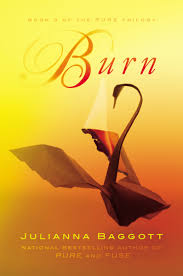The third novel of Julianna Baggott’s Pure Trilogy, after the first two brilliant novels Pure and Fuse, had a lot to live up to. Burn followed the continued journey of Pressia, El Capitan, Lyda and Partridge through the bleak, ash filled world post the Detonations that divided families and communities into Wretches and Pures. Baggott remained faithful to the tone of the series, characters struggling to make the right choices, often making the wrong ones and having to handle the consequences. Baggott’s writing style is poetic, it’s heavy with symbolism that crosses all three books and the characters are wonderfully portrayed in all their flawed beauty.
But.
If you haven’t read the book, this is your SPOILER ALERT so turn away now.
Yes it’s dystopian literature at its raw best and in a world where people are fused to siblings, doll heads and flocks of birds you shouldn’t really expect a happy ending, but…
The end was a let down nonetheless. Taking a page out of Suzanne Collin’s Hunger Games books, the ending kind of falls to pieces. With the build up from the previous novels, I wanted some resolution not just for the characters (Bradwell, what were you thinking?) but for the world itself. Instead nothing really has changed. If that was what Baggott was aiming for then she does it well, emphasising the fact that the cure promised by the adults is not a cure after all; the hopeful future they were fighting for was an illusion and makes a social comment on how it’s not up to the next generation to save the world, but ourselves. Lyda is left to bring a new life into a horrible, wasteland of a world without a father (what on earth was Partridge thinking?) and Bradwell joins his family in matrydom, leaving Pressia to confront the aftermath without him. It’s like their survival instincts that had managed to get them so far just upped and died on them. The only one who seems to have his (and his brother’s) head on straight is El Capitan who stands by his promise to stay with Pressia no matter what.
It feels like there should’ve been a whole other book to tie it up. Baggott has left “what happens next” open to her readers and I’m usually all for author’s adding something unresolved that ensures a novel stays lingering in a reader’s mind, but only after the satisfactory epiphany or climax.
Perhaps I had my expectations set too high, maybe I fell in love with the characters too much, and while I didn’t expect a happily ever after, I was at least hoping for a somewhat triumphant one.
After I finished this book, it did leave me thinking though about what makes us human, the creation of identity through body image and recollections, and I’ve found myself wandering down the path of post-humanism in my spare time (ha!). The themes Baggott plays with are complex and uniquely explored and I’d recommend this series to both adults and young adults alike. But I’d like to hear your thoughts on the ending. Was it just right or not right enough?

